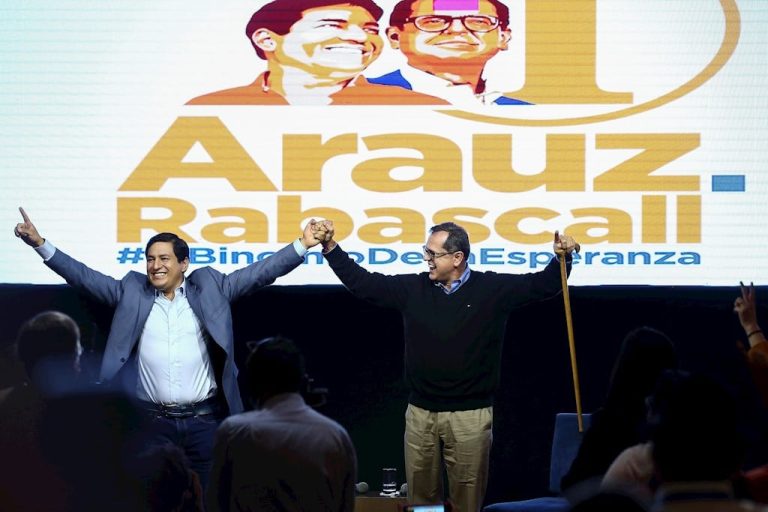8 de febrero 2021

Children of Exile: The Births “Sowing Hope” in the Camp of Nicaraguan Farmers

PUBLICIDAD 1M
PUBLICIDAD 4D
PUBLICIDAD 5D
Arauz will face a runoff against either Perez or Lasso on April 11th.

Andres Arauz, the candidate of former president Rafael Correa, obtained the largest number of votes in the elections in Ecuador on Sunday. Photo: EFE | Confidencial
Ecuador will hold a runoff election on April 11 to select its next president. The first round of voting on Sunday did not produce a winner. With 97.55% of the votes counted Andres Arauz, 36, a former economy minister under Rafael Correa, led the 16-candidate field with 32.19 of the votes.
Second place is still undecided in a tight race between banker Guillermo Lasso (19.60%) and the Indigenous environmentalist candidate Yaku Perez (19.81%). Xavier Hervas is in fourth place with 16.01%
During the vote count, Perez and Lasso exchanged the lead for second place several times. Both exchanged positions as the night and the count progressed. Perez had a much stronger showing than the pre-election polls predicted.
The remainder of the votes (approx. 12%) were fragmented among the twelve remaining candidates.
“It is a resounding victory,” Arauz told EFE in an interview late Sunday night. He said he is confident he will win the second round regardless of who is his opponent. However, he acknowledged he would prefer a clearer battle, facing Lasso his most antagonistic rival.
The candidate of former President Rafael Correa (2007 and 2017), Arauz is just 36 years old. He would be the youngest candidate to reach the Presidency in the history of Ecuador.
Arauz got involved in the summer of 2020 when Correa supporters were looking for a candidate to return power to their Citizen’s Revolution. The current president, Lenin Moreno, departed from Correa’s economic and social project when he took office in 2017.
Since then, Correa and Moreno have fought a battle that transferred to the elections this Sunday. This, despite the fact that Moreno didn’t run for reelection.
Lasso waited many hours to appear before the media, apparently, due to the great instability of his second place. He spoke from the Guayaquil Convention Center.
“Congratulations to the Ecuadorian people who by over 65% said no to the totalitarian and populist model. One that seeks to govern with policies that have failed in all countries where they have been applied.”
When the polls closed Lasso assured that all those who didn’t vote for Andres Arauz stand as an anti-Correa vote for the runoff. This, he said, would bring victory to whoever finishes second.
More convinced of his good results, the indigenous Yaku Pérez ran for office as an intermediate route between both currents, with a social and environmentalist agenda.
In the elections this Sunday, more than thirteen million Ecuadorians were called to elect their new president, vice president, and 137 members of the National Assembly and five of the Andean Parliament.
According to the CNE, just over 70 percent participated in the elections, on a day marked by the coronavirus pandemic that forced special measures to avoid a wave of infections.
The latest official statistics show Ecuador with 258,000 accumulated cases. Deaths amount to 15,012, between confirmed and probable cases, the Health Ministry reported on Sunday today.
The biosecurity measures imposed upon entering the polling places caused voting delays of up to three hours. Nonetheless, the long lines of several hundred meters did not disturb a process that proceeded normally.
The day in the main cities was characterized by long lines of voters outside the schools. They closed their doors at 5:00 p.m. local time. Those who did not vote face a $40 fine.
The CNE repeatedly asked citizens to come with a mask, their own pen and disinfectant alcohol. Its president, Diana Atamaint, said she was surprised by the influx of voters despite the pandemic.
Her advisor, Enrique Pita, told a press conference that despite the pandemic, absenteeism was not more than usual.
PUBLICIDAD 3M
Agencia de noticias internacional con sede en Madrid, España. Fundada en Burgos durante la guerra civil española en enero de 1939.
PUBLICIDAD 3D